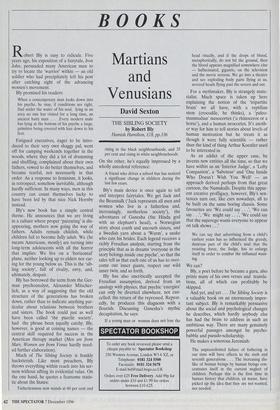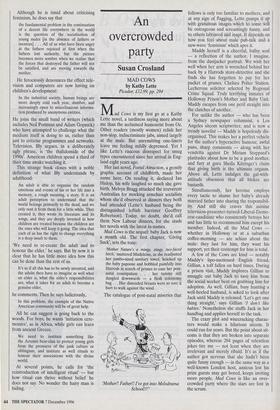BOOKS
Martians and Venusians
David Sexton
THE SIBLING SOCIETY by Robert Bly Hamish Hamilton, £18, pp.336 Robert Bly is easy to ridicule. Five years ago, his exposition of a fairytale, Iron John, persuaded many American men to try to locate the 'warrior' within — an old soldier who had precipitately left his post after catching sight of the advancing women's movement.
Bly promised his readers:
When a contemporary man looks down into his psyche, he may, if conditions are right, find under the water of his soul, lying in an area no one has visited for a long time, an ancient hairy man . . . .Every modern male has lying at the bottom of his psyche a large, primitive being covered with hair down to his feet.
Fatigued executives, eager to be intro- duced to their very own shaggy pal, went off for camping weekends together in the woods, where they did a lot of drumming and shuffling, complained about their own fathers, vowed to do better themselves, and became tearful, not necessarily in that order. As a response to feminism, it looks, in retrospect, somehow inevitable, although hardly sufficient. In many ways, men in this country can count themselves lucky to have been led by that nice Nick Hornby instead.
Bly's new book has a simple central theme. He announces that we are living in a culture where proper 'parenting' is dis- appearing, mothers now going the way of fathers. Adults remain childish, while children fail to become fully adult. We (he means Americans, mostly) are turning into long-term adolescents with all the horror that implies. We live on a 'horizontal' plane, neither looking up to elders nor car- ing for the young below us. This is the 'sib- ling society', full of rivalry, envy, and, ultimately, despair.
Bly has borrowed the term from the Ger- man psychoanalyst, Alexander Mitscher- lich, as a way of suggesting that the old structure of the generations has broken down, rather than to indicate anything par- ticular about relations between brothers and sisters. The book could just as well have been called 'the puerile society', had the phrase been equally catchy. Bly, however, is good at coining names --the central skill required for success in the American therapy market (Men are from Mars, Women are from Venus hardly need- ed further elaboration).
Much of The Sibling Society is frankly hucksterish. Like most preachers, Bly throws everything within reach into his ser- mon without sifting its evidential value. On the one hand, he quotes a fearsome statis- tic about the States:
Fatherlessness now stands at 60 per cent and rising in the black neighbourhoods, and 35 per cent and rising in white neighbourhoods.
On the other, he's equally impressed by a wholly anecdotal reference:
A friend who drives a school bus has noticed a significant change in children during the last few years.
Bly's main device is once again to tell and interpret fairytales. We get Jack and the Beanstalk Pack represents all men and women who live in a fatherless and, increasingly, motherless society'), the adventures of Ganesha (the Hindu god with an elephant's head), a Norwegian story about couth and uncouth sisters, and a Swedish yarn about a `Wurm', a snake who eats his brides. Each legend receives a richly Freudian analysis, starting from the principle that as in dreams 'everyone in the story belongs inside one psyche', so that the tales tell us that each one of us has to over- come our inner giants, respect our wild inner twin, and so forth.
Bly has also uncritically accepted the Freudian assumption, derived from an analogy with physics, that psychic 'energies' can only be diverted elsewhere, not can- celled: the return of the repressed. Repeat- edly, he produces this diagnosis with a flourish. Discussing Ganesha's mythic decapitation, he says:
If a young man or woman does not lose the head ritually, and if the drops of blood, metaphorically, do not hit the ground, then the blood appears magnified somewhere else — hallucinated, gigantic, on the television and the movie screens. We go into a theatre and see exploding body parts flying at us, severed heads flying past the screen and out.
For a mythmaker, Bly is strangely mate- rialist. Much space is taken up here explaining the notion of the 'tripartite brain' we all have, with a reptilian stem (crocodile, he thinks), a `paleo- mammalian' mesocortex Ca rhinoceros or a horse'), and a human neocortex. It's anoth- er way for him to tell stories about levels of human motivation but he treats it as though it were fully scientific — rather than the kind of thing Arthur Koestler used to be interested in.
As an addict of the upper case, he invents new entities all the time, so that we have within us an 'Interior Judge', a 'Lofty Companion', a 'Saboteur' and 'One Inside Who Doesn't Wish You Well' — an approach derived perhaps from that great cartoon, the Numskulls. Despite this appar- ent creative profligacy, however, Bly's sen- tences turn out, like cars nowadays, all to be built on the same boring chassis. Some favourites are 'We could say. . 'We can say. .', 'We might say . . 'We could say that the superego wants everyone to appear on talk shows ...'
We can say that advertising from a child's earliest years has so influenced the greedy, desirous part of the child's soul that the resisting force, the Judge, has to enlarge itself in order to combat the inflamed want- ing.
We can?
Bly, a poet before he became a guru, also prints many of his own verses and transla- tions, all of which can profitably be skipped.
And yet, and yet. . . The Sibling Society is a valuable book on an enormously impor- tant subject. Bly is remarkably persuasive about the social and psychological changes he describes, which hardly anybody else has had the brass to address in such an ambitious way. There are many genuinely powerful passages amongst he psycho- babble and pseudo-scholarship.
He makes a sonorous Jeremiah:
The unprecedented failure of fathering in our time will have effects to the sixth and seventh generations . . . The increasing dis- like of human beings by human beings con- centrates itself in the current neglect of children. Perhaps this is the first time in human history that children, en masse, have picked up the idea that they are not wanted, not needed. Although he is timid about criticising feminism, he does say that the fundamental problem in the continuation of a decent life everywhere in the world is the question of the socialisation of young males [in the absence of fathers or mentors] . . . All of us who have been angry at the fathers rejoiced at first when the fathers lost authority, but the picture becomes more sombre when we realise that the forces that destroyed the father will not be satisfied, and are moving towards the mother.
He ferociously denounces the effect tele- vision and computers are now having on children's development:
In the industrial society, human beings are more deeply cold each year, dumber, and increasingly open to miscellaneous informa- tion produced by anonymous entities.
He joins the small band of writers (which includes Neil Postman and Adam Gopnick) who have attempted to challenge what the medium itself is doing to us, rather than just to criticise programmes and networks. Television, Bly argues, in a deliberately ugly phrase, is 'the thalidomide of the 1990s'. American children spend a third of their time awake watching it.
This strange book closes with a noble definition of what Bly understands by adulthood:
An adult is able to organise the random emotions and events of his or her life into a memory, a rough meaning, a story. It is an adult perception to understand that the world belongs primarily to the dead, and we only rent it from them for a little while. They created it, they wrote its literature and its songs, and they are deeply invested in how children are treated because the children are the ones who will keep it going. The idea that each of us has the right to change everything is a deep insult to them.
'We need to re-create the adult and to honour the elder,' he says. But by now it is clear that he has little more idea how this can be done than the rest of us.
It's as if all this has to be newly invented, and the adults then have to imagine as well what an elder is, what the elder's responsibilities are, what it takes for an adult to become a genuine elder,
he comments. Then he says ludicrously,
In this problem, the example of the Native American community will be of great help.
All he can suggest is going back to the woods. For boys, he wants 'initiation cere- monies', as in Africa, while girls can learn from ancient Greece.
We need to institute something like the Artemis bear-clan to protect young girls from the pressures of the junk culture or siblingism, and institute as well rituals to honour their associations with the divine world.
At several points, he calls for 'the reintroduction of intelligent ritual' — but how ritual can thrive without belief he does not say. No wonder the hairy man is hiding.



















































































 Previous page
Previous page